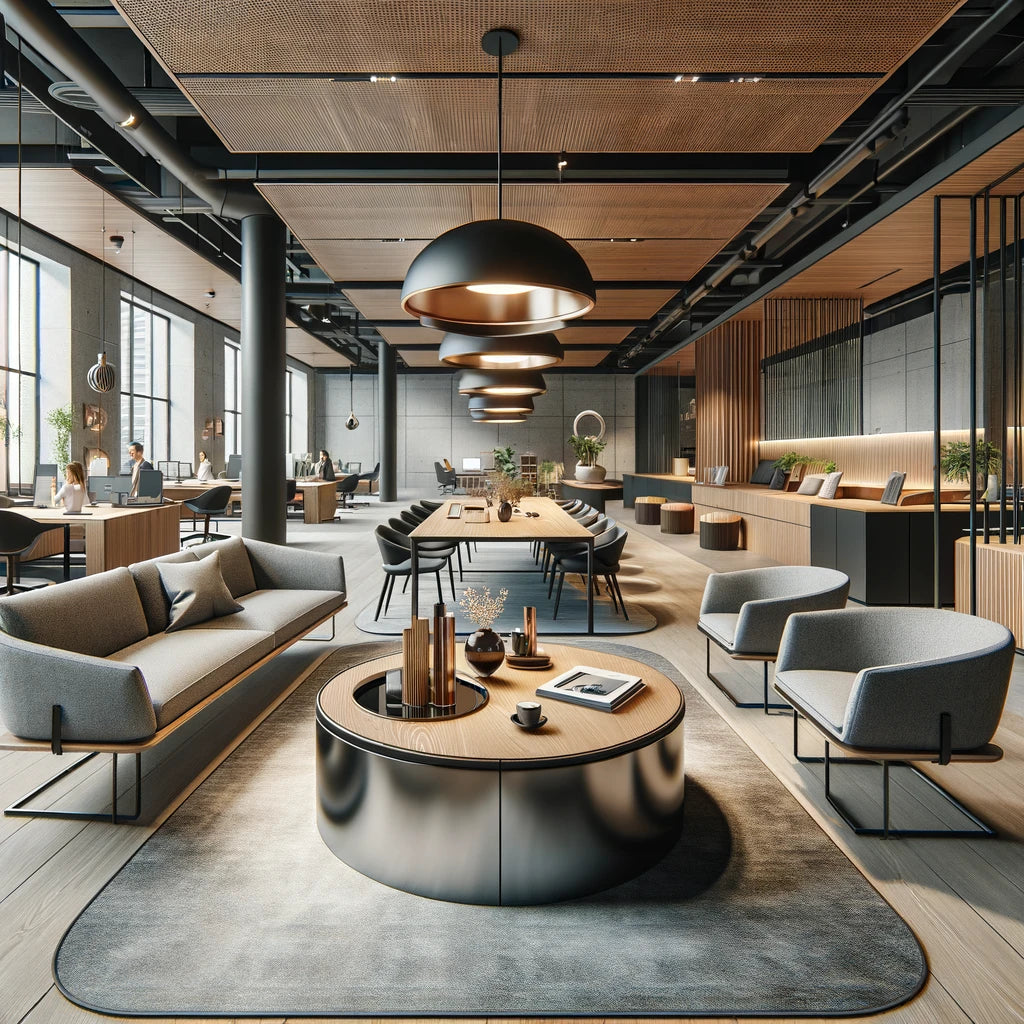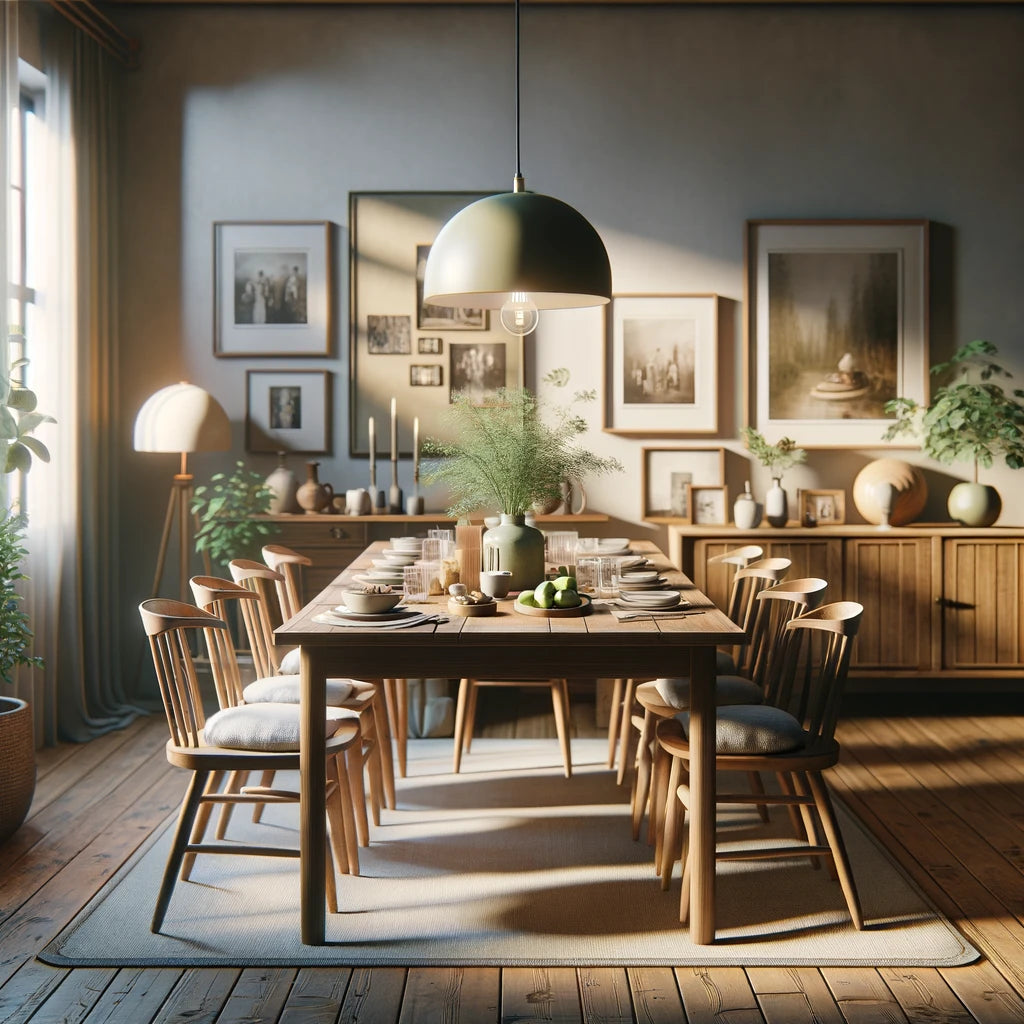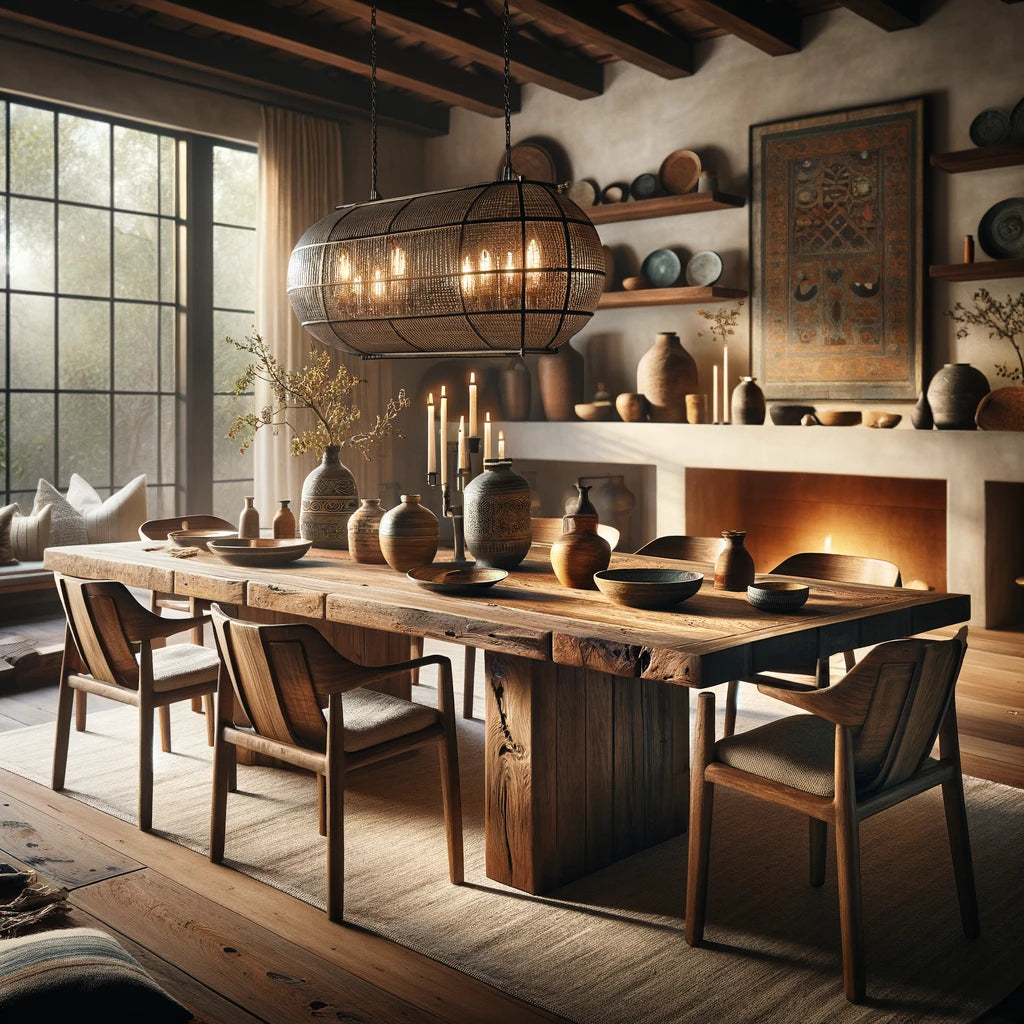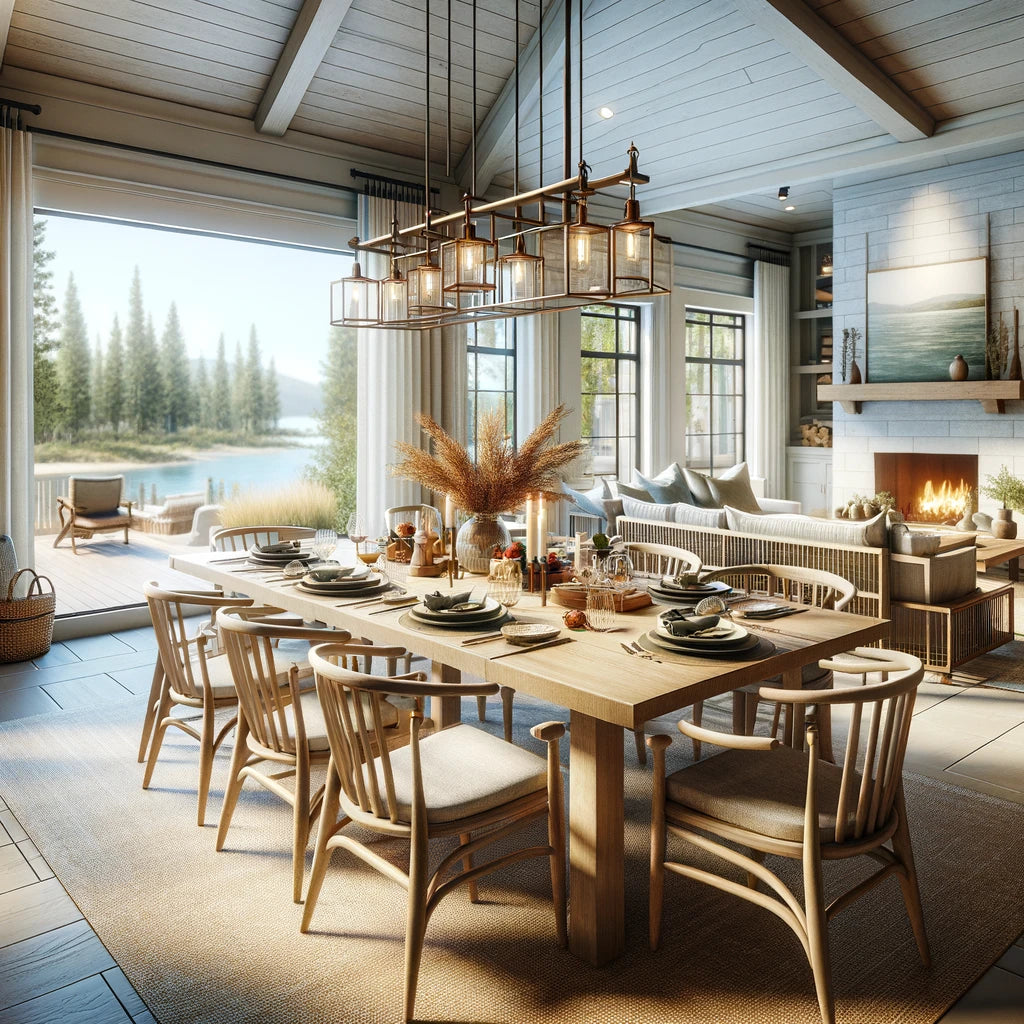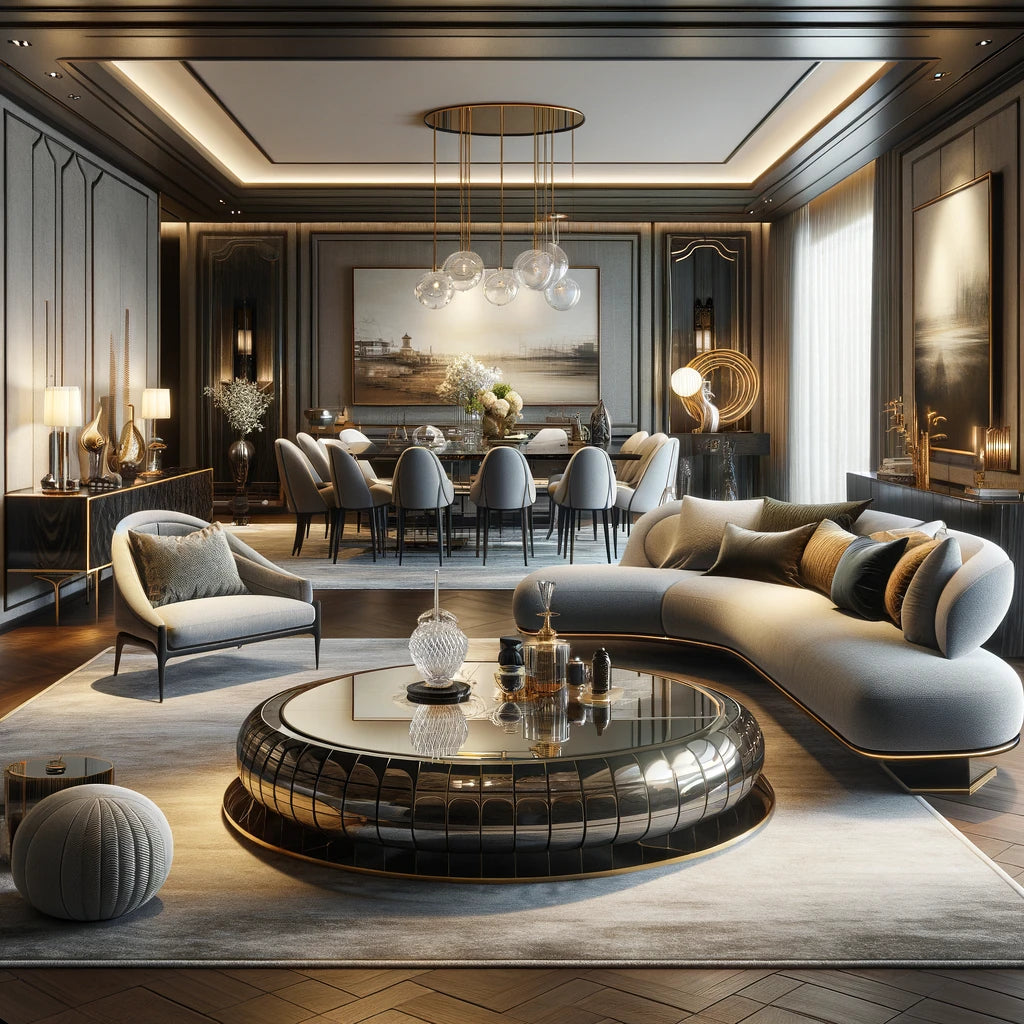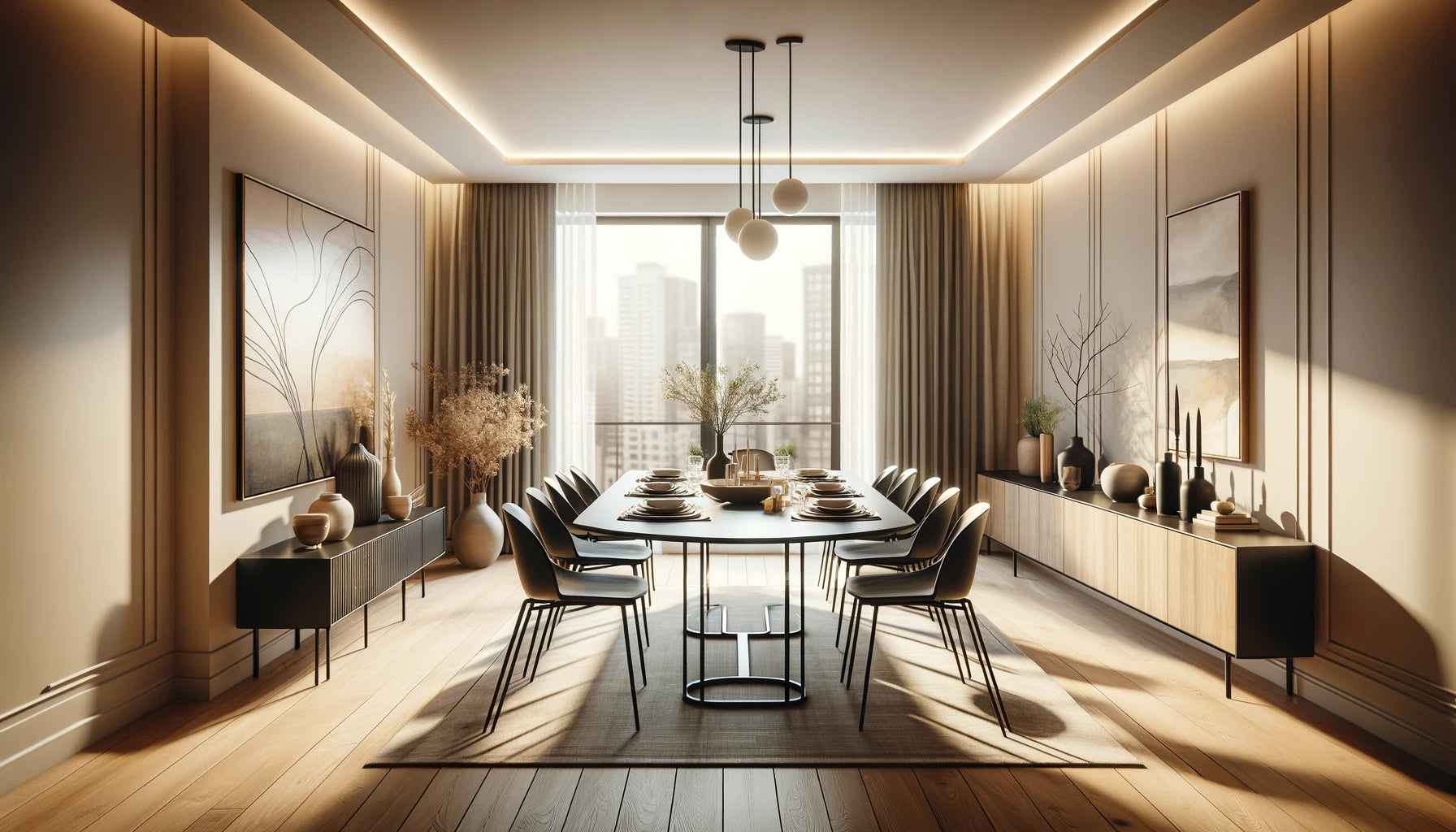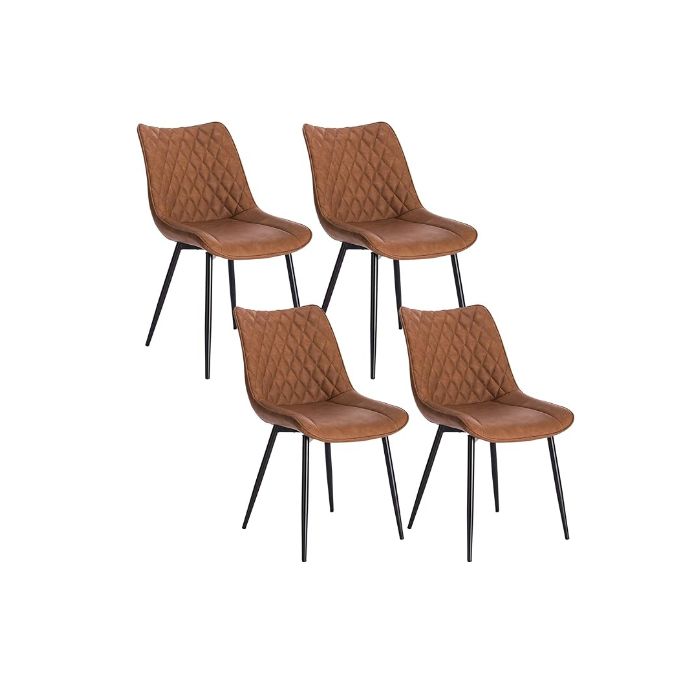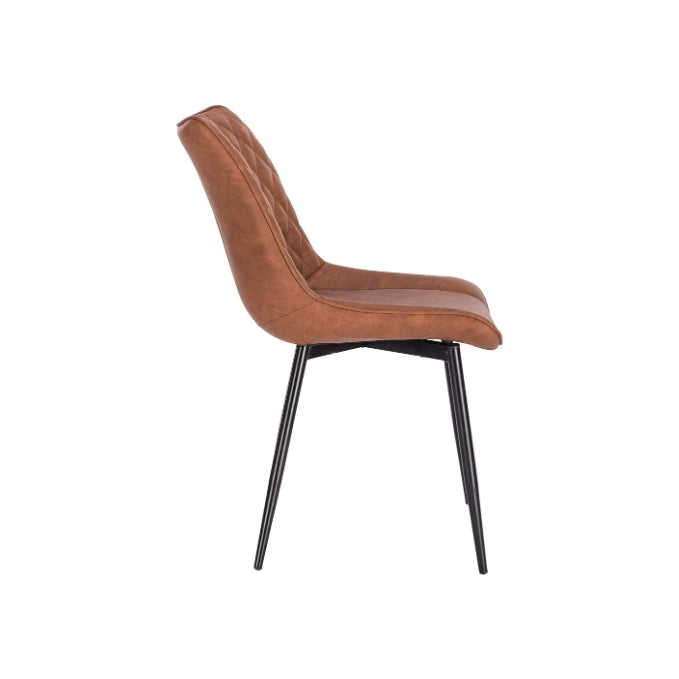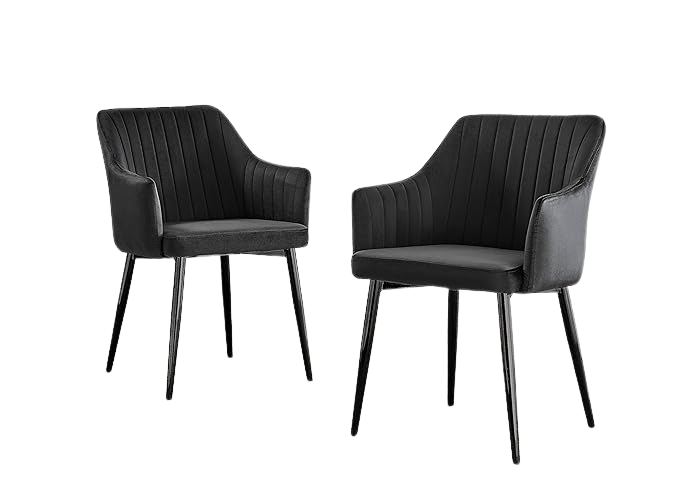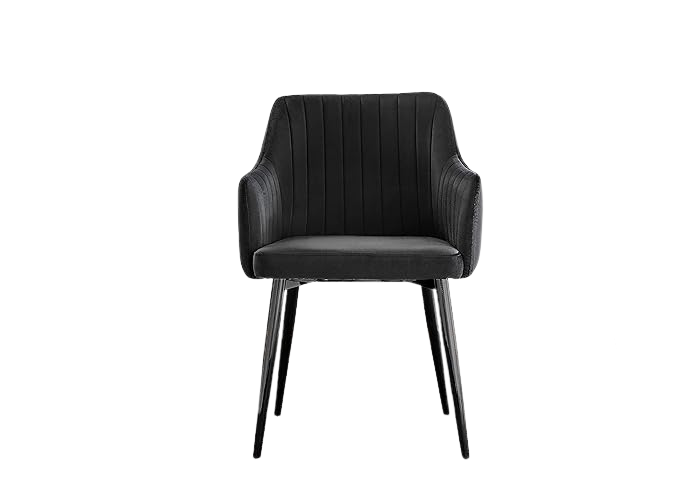In the world of corporate interior design, the selection of furniture goes beyond mere aesthetics; it's about making a statement, enhancing functionality, and reflecting company culture.
Among these essential pieces, coffee and dining tables stand out for their ability to transform common areas and meeting rooms into dynamic, inviting spaces.
This blog explores the nuanced art of choosing the right tables for corporate environments, blending style with function to create spaces that not only look impressive but also cater to the needs of employees and guests alike.
The Role of Tables in Corporate Environments
Coffee Tables
Coffee tables play a crucial role in corporate settings, serving as more than just functional furniture pieces.
They are carefully selected to contribute to the overall atmosphere and functionality of lounge areas, waiting rooms, and informal meeting spaces. Here's an exploration of the significance and impact of coffee tables in corporate environments:
- Centrepiece of Lounge Areas:
- Welcoming Atmosphere: Coffee tables act as the focal point of lounge areas, creating a welcoming and inviting ambiance for employees, clients, and visitors. Their strategic placement in the centre of the room encourages people to gather, relax, and engage in casual conversations or impromptu meetings.
- Comfortable Gathering Spaces: By providing comfortable seating around the coffee table, companies can foster a sense of community and camaraderie among employees. These lounge areas serve as informal gathering spaces where colleagues can connect, collaborate, and recharge in between tasks or meetings.
- Enhanced Collaboration and Interaction:
- Facilitating Collaboration: Coffee tables facilitate collaboration and interaction among employees by providing a central space for sharing ideas, brainstorming sessions, or casual discussions. Their low height and accessible surface make them ideal for spreading out documents, laptops, or other materials during collaborative work sessions.
- Encouraging Informal Meetings: Coffee tables encourage spontaneous meetings and conversations that can lead to creative solutions, innovative ideas, and strengthened relationships among colleagues. Their presence in common areas signals to employees that the company values open communication, teamwork, and collaboration.
- Symbol of Attention to Detail:
- Reflecting Company Values: Coffee tables reflect the company's attention to detail and commitment to providing comfortable and aesthetically pleasing work environments. Their design, quality, and placement are carefully considered to align with the company's brand image, culture, and values.
- Creating Lasting Impressions: For clients, partners, or job candidates visiting the corporate office, coffee tables contribute to the overall impression of professionalism, sophistication, and hospitality. A well-appointed lounge area with thoughtfully chosen coffee tables can leave a lasting positive impression on visitors, reinforcing the company's reputation and credibility.
- Functional Versatility:
- Multipurpose Utility: Coffee tables serve a variety of functions beyond just holding drinks and reading materials. They can double as impromptu workstations, display areas for promotional materials or company literature, or even as temporary seating during crowded events or meetings.
- Customisation Options: Companies can customise coffee tables to suit their specific needs and preferences, whether it's incorporating built-in storage compartments, wireless charging capabilities, or integrated power outlets for charging electronic devices. These customised features enhance the functionality and versatility of coffee tables in corporate settings.
In summary, coffee tables play a multifaceted role in corporate environments, serving as focal points of lounge areas, facilitators of collaboration and interaction, symbols of attention to detail, and versatile furniture pieces that enhance the overall work experience for employees and visitors alike.
By selecting and designing coffee tables thoughtfully, companies can create comfortable, functional, and aesthetically pleasing spaces that support productivity, creativity, and well-being in the workplace.
On the topic of coffee tables, please check our range of custom coffee tables. If you would like to customise your options further, please get in touch with us.
Dining Tables
Dining tables play a crucial role in corporate environments beyond their traditional use in cafeterias.
They serve as versatile pieces of furniture in breakout areas, meeting rooms, and collaborative spaces, offering employees a comfortable and conducive environment for various activities. Here's an in-depth exploration of the significance and impact of dining tables in corporate settings:
- Versatility in Usage:
- Lunch Breaks and Informal Gatherings: Dining tables provide employees with a designated space to enjoy lunch breaks, grab coffee, or socialise with colleagues in a relaxed setting. These informal gatherings foster camaraderie, team bonding, and a sense of community among co-workers, contributing to a positive work culture.
- Collaborative Work Sessions: Dining tables serve as flexible workspaces for impromptu meetings, brainstorming sessions, or collaborative projects. Their large surface area and comfortable seating accommodate groups of employees who need a space to gather, share ideas, and work together on tasks or projects.
- Enhanced Productivity and Comfort:
- Comfortable and Ergonomic Design: The right dining table enhances productivity and comfort by providing employees with a comfortable and ergonomic workspace. Adjustable-height tables, ergonomic chairs, and ample legroom ensure that employees can work or dine comfortably for extended periods without discomfort or fatigue.
- Promotion of Well-being: Well-designed dining tables contribute to employee well-being by offering a space where they can relax, recharge, and refuel during breaks. Access to natural light, comfortable seating, and aesthetically pleasing surroundings create a positive and uplifting environment that supports employee morale and satisfaction.
- Consideration of Form and Function:
- Aesthetic Appeal: Dining tables in corporate environments should strike a balance between form and function, blending aesthetic appeal with practicality. Sleek, modern designs or timeless classics can complement the overall design aesthetic of the office while creating a visually pleasing focal point in breakout areas or meeting rooms.
- Durability and Maintenance: It's essential to consider the durability and maintenance requirements of dining tables, especially in high-traffic areas. Opt for materials such as hardwoods, laminate, or metal that are easy to clean, resistant to scratches, and capable of withstanding the rigours of daily use in a corporate environment.
- Facilitation of Collaboration and Innovation:
- Promotion of Collaboration: Dining tables serve as hubs for collaboration and innovation, fostering a culture of teamwork, creativity, and problem-solving in the workplace. By providing employees with a designated space for collaborative work, companies can encourage cross-functional collaboration, knowledge sharing, and idea generation.
- Support for Agile Work Practices: Dining tables support agile work practices by offering employees the flexibility to choose where and how they work. Whether it's a formal meeting, informal discussion, or solo work session, dining tables provide employees with the freedom to adapt their workspace to suit their specific needs and preferences.
In summary, dining tables in corporate environments play a multifaceted role in enhancing productivity, comfort, collaboration, and well-being among employees.
By providing a versatile space for lunch breaks, informal gatherings, and collaborative work sessions, dining tables contribute to a positive work culture and support the diverse needs of employees in modern workplaces. When selecting dining tables for corporate settings, it's essential to consider both form and function, ensuring that they meet the aesthetic, practical, and ergonomic requirements of the space.
Now, please check our range of custom dining tables. If you would like to customise your options further, please get in touch with us.
Blending Style with Function
Material Matters
In corporate settings, the choice of materials for coffee and dining tables is a critical consideration that balances durability with design aesthetics.
Here's an exploration of the significance of material selection and its impact on both functionality and the overall atmosphere of the space:
- Durability and Longevity:
- Tempered Glass: Tempered glass is a popular choice for corporate coffee and dining tables due to its durability and resistance to scratches, stains, and heat. It offers a sleek and contemporary look while providing a sturdy surface for daily use in high-traffic areas.
- High-Quality Wood: Solid wood, such as oak, walnut, or maple, is prized for its durability, strength, and timeless appeal. Wood tables add warmth and sophistication to corporate spaces while withstanding the rigours of daily use. Opting for high-quality wood ensures longevity and resistance to warping or damage over time.
- Metal: Metal tables, such as those made from stainless steel or aluminium, are known for their durability, stability, and modern aesthetic. Metal surfaces are easy to clean and maintain, making them ideal for corporate environments where cleanliness and professionalism are paramount.
- Professional Aesthetic:
- Sleek and Modern Designs: Materials like tempered glass and metal lend themselves to sleek and modern table designs that convey professionalism and sophistication. These materials complement contemporary office interiors, creating a sleek and polished look that reflects the company's progressive ethos.
- Warm and Inviting Vibes: Alternatively, high-quality wood tables evoke a sense of warmth, elegance, and tradition in corporate settings. Wood's natural grain and texture add character and charm to the space, creating a welcoming and inviting atmosphere for employees and visitors alike.
- Customisation and Personalisation:
- Tailored to Brand Identity: The choice of materials for coffee and dining tables can be tailored to reflect the company's brand identity, culture, and values. Whether it's a minimalist glass table for a tech start-up or a solid wood table for a heritage brand, materials play a crucial role in conveying the desired image and message.
- Custom Finishes and Details: Companies can further personalise their tables with custom finishes, stains, or detailing to align with their specific design preferences. These customised touches add a unique and distinctive flair to the tables, reinforcing the company's individuality and attention to detail.
- Maintenance and Care:
- Ease of Cleaning: Consider the maintenance requirements of different materials when selecting coffee and dining tables for corporate settings. Materials like tempered glass and metal are easy to clean with a simple wipe-down, while wood may require periodic polishing or conditioning to maintain its lustre.
- Long-Term Maintenance: Factor in the long-term maintenance and care of the tables to ensure their durability and longevity. Investing in high-quality materials and finishes upfront can help minimise the need for repairs or replacements down the line, saving time and resources in the long run.
In summary, the choice of materials for coffee and dining tables in a corporate setting is a critical decision that impacts both functionality and aesthetics.
By balancing durability with design, companies can select materials that withstand the demands of daily use while enhancing the overall atmosphere and image of the space. Whether opting for sleek and modern designs or warm and inviting vibes, the right materials can elevate the look and feel of corporate interiors while meeting the practical needs of employees and visitors.
Design Considerations
Design considerations for coffee and dining tables in a corporate setting are crucial for creating functional, visually appealing, and conducive environments for employees, clients, and visitors.
Here's an in-depth exploration of key design considerations and their impact on the overall layout and atmosphere of the space:
- Room Size and Shape:
- Optimal Space Utilisation: Consider the size and shape of the room when selecting coffee and dining tables to ensure optimal space utilisation. Choose tables that fit comfortably within the room's dimensions without overcrowding or obstructing traffic flow.
- Scale and Proportion: Tables should be proportionate to the size of the room, with sufficient clearance around them to allow for easy movement and access. Avoid oversized tables that dominate the space or undersized tables that appear lost in large rooms.
- Functionality and Capacity:
- Meeting Area Versatility: In meeting areas, consider tables with versatile designs that accommodate different group sizes and meeting formats. Adjustable-height tables, modular configurations, or extendable options offer flexibility and adaptability to varying needs and preferences.
- Dining Space Requirements: For dining spaces, select tables with adequate seating capacity to accommodate employees during meal times or corporate events. Consider factors such as the number of employees, the frequency of use, and the desired level of comfort when determining the table's capacity.
- Shape and Configuration:
- Round Tables: Round tables are conducive to better conversation and collaboration in meeting areas, as they allow for equal participation and eye contact among participants. They are ideal for small to medium-sized groups and informal discussions.
- Rectangular Tables: Rectangular tables are well-suited for dining spaces and larger gatherings, offering ample surface area for food, beverages, and place settings. They facilitate efficient use of space and can accommodate larger groups with ease.
- Complementary Style:
- Consistency with Corporate Interior: The style of coffee and dining tables should harmonise with the overall design aesthetic of the corporate interior. Whether aiming for a classic, contemporary, or avant-garde look, select tables that complement existing furniture, finishes, and architectural elements.
- Material and Finish Compatibility: Consider the material and finish of the tables in relation to other design elements in the space. Choose materials and finishes that coordinate with flooring, wall treatments, lighting fixtures, and upholstery to create a cohesive and unified look.
- Accessibility and Ergonomics:
- Accessibility Considerations: Ensure that tables are accessible to all employees, including those with mobility challenges or disabilities. Consider factors such as table height, legroom clearance, and seating arrangements to accommodate diverse needs and preferences.
- Ergonomic Design: Opt for tables with ergonomic design features, such as smooth edges, adjustable heights, and comfortable seating options, to promote employee comfort and well-being during extended periods of use.
In summary, design considerations for coffee and dining tables in a corporate setting encompass a range of factors, including room size and shape, functionality and capacity, shape and configuration, complementary style, and accessibility and ergonomics.
By carefully evaluating these considerations and selecting tables that align with the specific needs and design objectives of the space, companies can create inviting, functional, and aesthetically pleasing environments that enhance productivity, collaboration, and employee satisfaction.
Enhancing Brand Identity Through Furniture
Enhancing brand identity through coffee and dining tables in corporate environments involves utilising these furniture pieces as powerful tools for visual communication and cultural reinforcement.
Here's an exploration of how custom tables can strengthen brand identity and foster a positive workplace culture:
- Visual Representation of Brand Values:
- Corporate Colours and Logos: Custom coffee and dining tables can be designed to incorporate corporate colours, logos, or visual elements that represent the company's brand identity. By prominently displaying these brand elements on furniture pieces, companies reinforce their visual identity and create a cohesive brand experience throughout the workspace.
- Thematic Design Elements: Tables can also be customised to reflect specific themes or narratives associated with the company's brand values, mission, or history. Whether it's showcasing images of the company's products, projects, or milestones, thematic design elements help tell the story of the brand and connect employees to its core values and mission.
- Brand Integration in Workspace Design:
- Strategic Placement: Coffee and dining tables strategically placed in key areas of the workspace, such as reception areas, lounges, or meeting rooms, serve as brand touchpoints that leave a lasting impression on employees, clients, and visitors. These branded tables become focal points that reinforce the company's identity and create memorable experiences.
- Consistent Design Language: Custom tables should align with the overall design language and aesthetic of the corporate interior to ensure consistency and coherence. Whether it's a sleek and modern design for a tech start-up or a more traditional and elegant design for a heritage brand, tables should reflect the company's unique personality and style.
- Employee Engagement and Pride:
- Sense of Belonging: Branded coffee and dining tables contribute to a sense of belonging and pride among employees by visually reinforcing the company's identity and values. When employees see familiar brand elements integrated into their workspace furniture, they feel a stronger connection to the organisation and a sense of ownership in its success.
- Positive Workplace Culture: Custom tables serve as tangible manifestations of the company's commitment to creating a positive and inclusive workplace culture. By investing in branded furniture that reflects the company's values and culture, companies demonstrate their dedication to employee satisfaction, well-being, and engagement.
- Memorable Brand Experiences:
- Creating Impactful Impressions: Branded coffee and dining tables create memorable brand experiences for clients, partners, and visitors. When guests encounter custom tables that reflect the company's brand identity and culture, they are more likely to form positive associations and perceptions of the brand, leading to increased brand loyalty and advocacy.
- Differentiation and Recognition: Custom tables help differentiate the company from competitors and establish a unique and recognisable brand presence in the marketplace. When tables are customised with distinctive brand elements, they stand out as signature pieces that reinforce the company's identity and set it apart from others in the industry.
In summary, enhancing brand identity through coffee and dining tables involves customising these furniture pieces to reflect the company's visual identity, values, and culture.
By strategically integrating branded tables into the corporate workspace, companies create impactful brand experiences, strengthen employee engagement and pride, and differentiate themselves in the marketplace. Custom tables serve as powerful tools for visual communication, cultural reinforcement, and brand differentiation, contributing to a cohesive and memorable brand presence that resonates with employees, clients, and visitors alike.
Innovative Features for Modern Needs
In today's rapidly evolving corporate landscape, furniture innovation plays a pivotal role in meeting the diverse needs of modern workplaces.
Coffee and dining tables with innovative features are essential elements that enhance productivity, connectivity, and adaptability.
Here's an exploration of innovative features designed to address modern needs in corporate spaces:
- Built-in Charging Stations:
- Addressing Tech Dependency: In a digital age where technology is integral to daily operations, tables equipped with built-in charging stations provide a convenient solution for powering electronic devices. Employees can easily charge their smartphones, laptops, tablets, and other gadgets without the need for bulky adapters or extension cords.
- Enhanced Connectivity: Built-in charging stations promote connectivity and collaboration by ensuring that employees stay connected and accessible throughout the workday. Whether it's responding to emails, participating in virtual meetings, or accessing digital resources, employees can rely on fully charged devices to stay productive and engaged.
- Cable Management Systems:
- Promoting Organisation and Safety: Cable management systems help keep workspace clutter-free by neatly concealing cables, wires, and power cords under the table surface. This not only improves the aesthetic appearance of the workspace but also reduces the risk of tripping hazards and accidents.
- Facilitating Flexibility: Cable management systems enhance workspace flexibility by allowing employees to easily connect and disconnect devices as needed. Whether it's rearranging furniture layouts, adding or removing technology peripherals, or accommodating new equipment, cable management systems support seamless adaptability and reconfiguration.
- Adjustable Heights:
- Ergonomic Comfort: Tables with adjustable heights promote ergonomic comfort and well-being by allowing employees to customise their workspace to suit their individual preferences and needs. Employees can easily transition between sitting and standing positions throughout the day, reducing the strain on muscles and joints associated with prolonged sitting.
- Supporting Dynamic Workstyles: Adjustable-height tables accommodate diverse workstyles and activities, from focused solo work to collaborative group discussions. They empower employees to create dynamic and adaptable work environments that support creativity, productivity, and overall job satisfaction.
- Integration of Technology:
- Smart Table Solutions: Innovative tables may feature integrated technology solutions, such as touchscreen displays, interactive whiteboards, or wireless connectivity options. These smart table solutions enhance collaboration, communication, and productivity by providing intuitive tools for brainstorming, ideation, and information sharing.
- IoT Connectivity: Tables equipped with IoT (Internet of Things) connectivity can collect data on workspace usage, environmental conditions, and employee behaviours. This data-driven approach allows companies to optimise space utilisation, improve energy efficiency, and enhance employee well-being based on real-time insights and analytics.
- Future-proof Design:
- Scalability and Upgradability: Modern tables with innovative features are designed to be scalable and upgradable, ensuring compatibility with emerging technologies and evolving workplace needs. Companies can invest in furniture solutions that grow and adapt alongside their business, minimising the need for costly replacements or retrofits in the future.
- Sustainability Considerations: Innovative tables should also incorporate sustainability principles, such as eco-friendly materials, energy-efficient components, and recyclable construction. By prioritising sustainability in furniture design, companies can reduce their environmental footprint and contribute to a greener and more sustainable future.
In summary, innovative features for modern coffee and dining tables in corporate spaces address the evolving needs of today's workforce, from technological integration to ergonomic comfort and sustainability.
By incorporating built-in charging stations, cable management systems, adjustable heights, and other advanced features, companies can create functional, future-proof workspaces that support employee productivity, connectivity, and well-being in a rapidly changing business landscape.
Sustainability and Corporate Responsibility
In today's global context, sustainability and corporate responsibility are increasingly becoming central pillars of business ethics and practices.
The choice of eco-friendly and sustainably sourced coffee and dining tables is a tangible manifestation of a company's commitment to environmental stewardship and social responsibility.
Here's an exploration of how such choices contribute to corporate sustainability efforts:
- Environmental Impact Reduction:
- Use of Reclaimed Materials: Opting for coffee and dining tables made from reclaimed wood, recycled metal, or other sustainable materials minimises the demand for virgin resources and reduces the environmental impact associated with extraction, processing, and transportation. By repurposing materials that would otherwise end up in landfills or contribute to deforestation, companies contribute to resource conservation and waste reduction.
- Lower Carbon Footprint: Sourcing eco-friendly materials locally or regionally further reduces the carbon footprint associated with transportation and logistics. By minimising the distance materials travel from source to production facility, companies decrease greenhouse gas emissions and support more sustainable supply chain practices.
- Promotion of Circular Economy Principles:
- Extended Product Lifespan: Coffee and dining tables made from reclaimed or recycled materials often boast durability and longevity, extending their lifespan and reducing the need for frequent replacements. By investing in furniture pieces designed to withstand the test of time, companies embrace circular economy principles that prioritise resource efficiency, product longevity, and waste reduction.
- Recyclability and Upcycling Potential: Eco-friendly tables are often designed with end-of-life considerations in mind, making them easier to recycle or repurpose at the end of their use cycle. Materials can be reclaimed, refurbished, or upcycled into new products, closing the loop on resource consumption and waste generation.
- Storytelling and Brand Differentiation:
- Narrative of Sustainability: Choosing sustainably sourced coffee and dining tables allows companies to weave a compelling narrative of sustainability into their brand identity and corporate culture. These tables serve as tangible symbols of the company's commitment to environmental responsibility, resonating with environmentally conscious consumers, employees, and stakeholders.
- Brand Differentiation: By prioritising sustainability in furniture selection, companies differentiate themselves in the marketplace and distinguish their brand as a leader in corporate responsibility. Sustainable practices can enhance brand reputation, attract environmentally conscious customers, and drive competitive advantage in increasingly eco-aware markets.
- Employee Engagement and Stakeholder Relations:
- Employee Pride and Engagement: Eco-friendly initiatives, including the use of sustainable furniture, foster a sense of pride and engagement among employees who value environmental sustainability. Employees are more likely to align themselves with companies that share their values and demonstrate a commitment to responsible business practices.
- Positive Stakeholder Relations: Sustainability initiatives, such as choosing sustainably sourced furniture, enhance relationships with stakeholders, including customers, investors, and community members. Demonstrating a proactive approach to environmental stewardship builds trust, credibility, and goodwill among stakeholders, contributing to long-term business success and resilience.
In summary, choosing eco-friendly and sustainably sourced coffee and dining tables is not only an expression of corporate responsibility but also a strategic investment in environmental sustainability, brand differentiation, and stakeholder engagement.
By prioritising sustainable practices in furniture selection, companies align themselves with global sustainability goals, reduce their environmental footprint, and contribute to a more resilient and equitable future for all.
Conclusion
The careful selection of coffee and dining tables can significantly influence the functionality, aesthetics, and overall vibe of corporate spaces.
By blending style with practicality, reinforcing brand identity, integrating innovative features, and committing to sustainability, companies can create environments that not only meet the demands of modern work but also inspire and engage their most valuable asset—their people.

